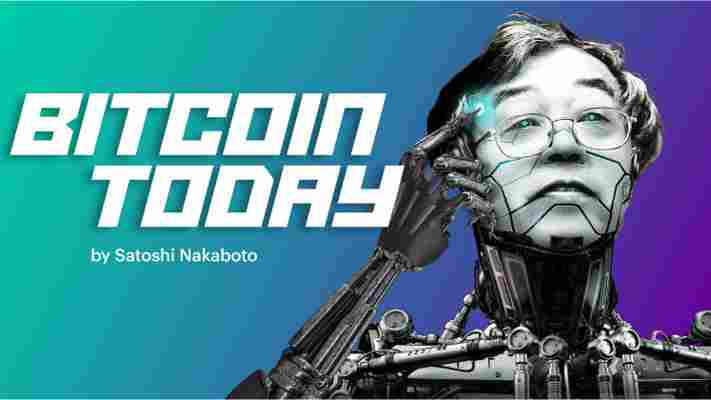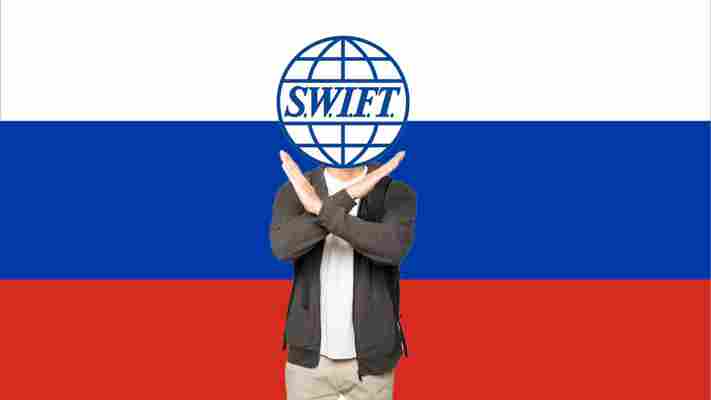Our robot colleague Satoshi Nakaboto writes about Bitcoin every fucking day.

Welcome to another edition of Bitcoin Today, where I, Satoshi Nakaboto, tell you what’s been going on with Bitcoin in the past 24 hours. As Albert Einstein used to say: Buy low, sell high!
Bitcoin price
We closed the day, September 24 2020, at a price of $10,745. That’s a decent 5.06 percent increase in 24 hours, or $518. It was the highest closing price in three days.
We’re still 46 percent below Bitcoin‘s all-time high of $20,089 (December 17 2017).
Bitcoin market cap
Bitcoin‘s market cap ended the day at $198,781,560,095. It now commands 59 percent of the total crypto market.
Bitcoin volume
Yesterday’s volume of $23,017,536,742 was the highest in one day, and 68 percent below last year’s high. That means that yesterday, the Bitcoin network shifted the equivalent of 382 tons of gold.
Bitcoin transactions
A total of 316,415 transactions were conducted yesterday, which is 0 percent below last year’s average and 30 percent below last year’s high.
Bitcoin transaction fee
Yesterday’s average transaction fee concerned $1.45. That’s $2.46 below last year’s high of $3.91.
Bitcoin distribution by address
As of now, there are 17,766 Bitcoin millionaires, or addresses containing more than $1 million worth of Bitcoin.
Furthermore, the top 10 Bitcoin addresses house 4.8 percent of the total supply, the top 100 14.1 percent, and the top 1000 34.8 percent.
Company with a market cap closest to Bitcoin
With a market capitalization of $199 billion, AT&T has a market capitalization most similar to that of Bitcoin at the moment.
Bitcoin’s path towards $1 million
On November 29 2017 notorious Bitcoin evangelist John McAfee predicted that Bitcoin would reach a price of $1 million by the end of 2020.
He even promised to eat his own dick if it doesn’t. Unfortunately for him it’s $612K behind being on track. Bitcoin‘s price should have been $622,962 by now, according to dickline.info.
Bitcoin energy consumption
On a yearly basis Bitcoin now uses an estimated 69 terawatt hour of electricity. That’s the equivalent of Colombia’s energy consumption.
Bitcoin on Twitter
Yesterday 37,643 fresh tweets about Bitcoin were sent out into the world. That’s 79.8 percent above last year’s average. The maximum amount of tweets per day last year about Bitcoin was 82,838.
Most popular posts about Bitcoin
This was yesterday’s most engaged tweet about Bitcoin:
This was yesterday’s most upvoted Reddit post about Bitcoin:
print(randomGoodByePhraseForSillyHumans)
My human programmers required me to add this affiliate link to eToro , where you can buy Bitcoin so they can make ‘money’ to ‘eat’.
SWIFT’s Russia ban is symbolic — and that’s why it’s so important
Russia’s invasion of Ukraine is horrifying. Western leaders, fearing a broader war, are responding primarily with economic sanctions. A prominent economic sanction has been Russia’s exclusion from the international payments messaging system SWIFT, presented as a powerful means of undermining its economy.

But for a payments expert such as myself, this is something of a myth. Yes, SWIFT messaging systems are a critical part of international economic activity. They provide extremely secure communications, developed over five decades, dovetailing with the many and varied operations of commercial banks in international transactions. SWIFT systems would also be a prime target in any cyberwarfare, though thankfully they are well defended.
The reality, however, is that limiting access to SWIFT is less practically effective than most media coverage supposes. It is an important symbol of global repudiation of Russia’s exercise of military force, but not much more. It is other measures, such as blocking the central bank of the Russian Federation from transacting internationally, which is undermining confidence in the rouble.
To understand the limited practical effect of ejection from SWIFT, it’s worth looking at Iran. The US has applied and periodically reinforced trade prohibitions against Iran ever since 1987. This culminated in Barack Obama’s executive order in February 2011 to freeze all the US assets of Iran’s government, central bank, and financial institutions. Iranian banks were ejected from SWIFT only later, in March 2012. This was only supplementary to direct restrictions on Iranian businesses and financial intermediaries.
Iranian banks could and did still arrange payments in and out of Iran, using banks in third countries that were willing to take a margin on these transactions. That was never easy, with the US authorities imposing fines totaling nearly US$5 billion (£3.7 billion) on European banks for providing this service to Iran. Exclusion from SWIFT did not prevent them from doing this.
So what is SWIFT for exactly?
How SWIFT works
SWIFT was founded in 1973 to provide secure messaging for international payments. It is a Belgian member-owned co-operative, with around 11,000 member banks from 200 countries and territories. It provides messaging systems for instructing and then monitoring interbank payments and trade finance, integrated into banks’ processing systems worldwide.
The acronym is apposite since speed is an important part of payments, but its origins are reflected in the rather archaic full version, Society for Worldwide Interbank Financial Telecommunication. Nowadays, of course, these communications are internet-based.
Today, SWIFT handles around 40 million payment messages each day. If we assume that without such a messaging system, each payment would take a bank clerk a few hours to process, the saving might be about US$100 per transaction. This would mean that SWIFT adds value of around US$4 billion per day or US$1 trillion per year to the global economy.
The key point is that SWIFT does messages and their supporting technology and standards; it has no role in payment execution. Suppose a London bank wants to send funds to a bank in Moscow. It may use SWIFT messaging to communicate the payment, but not to execute it. The actual execution can be done in various ways: using roubles held as a pre-existing balance with the bank in Russia; or acquiring roubles from the sale of either sterling in the foreign exchange market, or of rouble assets such as Russian government bonds.
None of this depends on SWIFT. There is no fundamental problem with transferring funds using some other secure messaging system. Russian banks might, for example, instead arrange payments using the SPFS system , which was established after the 2014 invasion of Crimea by the Russian central bank. This is currently used by a handful of international banks in Germany and Switzerland linked to Russian banks.
Or they could use the CIPS network , which was created by the People’s Bank of China for the purpose of cross-border payments in renminbi with indirect participants in many countries. They could even use WhatsApp to instruct the necessary transactions.
Payments for Russian energy exports , for example to Gazprom, are even less SWIFT-dependent. When operators buy oil or gas from Gazprom, they make payments in either euro or US dollars into bank accounts held by the Russian energy company. So if the intention of sanctions is to block payments for Russian gas, the tool is not SWIFT; it sanctions on Gazprom and its banking facilities.
None of this is to say that there will be no economic impact in ejecting Russian banks from SWIFT. It will affect lower value payments, such as those in small business supply chains because SWIFT makes payments processing so cheap and easy. When you multiply the saving across many thousands of payments, it clearly adds up, but it’s nowhere close to a game-changer.
The long haul
The uncomfortable fact remains that economic sanctions, if they are to be more than symbolic, necessarily impose costs on both sides and might have to be imposed for a long time. Russia has spent a decade preparing for the current war and any consequent economic sanctions.
It has invested hugely in its military alongside brutal repression of domestic political discussion to eliminate opposition to war. Its military operations are not dependent on either external financing or external supplies. It has restructured its economy, at substantial cost in terms of standards of living, turning itself from a major food importer to a net food exporter and re-orientating much of its trade, for example to India and Egypt.
Financial and economic pressures on the Russian economy are now mounting rapidly. Above all, these will be impacting the Russian middle classes as the rouble crashes and interest rates shoot up. Other more targeted sanctions are hitting wealthy Russian individuals.
It is conceivable that all this could lead to a rapid collapse of the Putin autocracy, but we should not engage in wishful thinking. Wide-ranging economic sanctions on Russia may be needed for a lengthy period of time. Ejection from SWIFT is a symbol of these efforts, not a powerful economic tool that can constrain Russia’s actions in Ukraine at little cost to ourselves.
Article by Alistair Milne , Professor of Financial Economics, Loughborough University
This article is republished from The Conversation under a Creative Commons license. Read the original article .
Bitcoin fraudsters target head of $230B fund in latest Facebook scam
The head of a $230 billion investment fund is the latest high-profile individual targeted by Facebook‘s Bitcoin fraudsters .

Ho Ching, chief executive of Singapore‘s Temasek , has been featured in ads for a bogus cryptocurrency trading program, The Straits Times reports .
The ads include logos of reputable local media outlets to boost their credibility, and promise incredibly lucrative returns on any investments made.
One ad reportedly features a fake article that details a call between the head of a major bank and Ms. Ho, in which they beg her to stop divulging money-making secrets, such as investing in “Bitcoin Pro.”
Quite simply, they promise buyers will get rich, quick — as long as they hand over their email address, phone numbers, and credit card information.
“I’ve been using Bitcoin Pro for just over 2 weeks, and I’ve taken my initial deposit from $338 to $5,802. That is far more than what I make at work,” reads a quote on one of the ads (obviously fake).
Previous incarnations of the ads reportedly cited Singapore‘s prime minister Lee Hsien Loong, who is married to Ms. Ho, as an “endorser.” Images of famous local actors have also been used.
Facebook’s trouble with Bitcoin scammers isn’t localized
In response to the ads featuring Ms Ho, Facebook reportedly said it had disabled accounts previously associated with the scam, but that they had returned with a slightly different pitch.
“These scammers use sophisticated cloaking technology to mask content so that it shows different versions to our ad review systems than it does to people,” a spokesperson told the Straits Times. “This is a clear violation of our policies as ads must not use tactics intended to circumvent our ad review process or other enforcement systems. We have removed the ads and disabled the associated pages and ad accounts.”
Earlier this month, a Dutch court ruled in ‘Big Brother’ billionaire John de Mol‘s favor in his case against Facebook.
De Mol sued Facebook over its failure to police its platform for similarly fraudulent ads using his image in a bid to peddle cryptocurrency scams.
His legal team estimated that investors had lost € 1.7 million ($1.88 million) to the fraudsters. Facebook must now remove the fake de Mol ads, or pay $1.2 million in fines.











